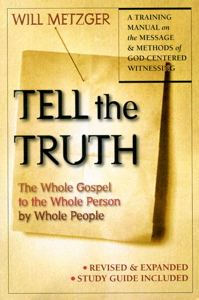Recently, I’ve read some debates revolving around doctrine and evangelism in the blogosphere (ie. JD Greear, Timmy Brister) and in scholarly journals (The Journal for Baptist Theology and Ministry). The unfortunate issue in debates on doctrine and evangelism is that most seem to focus either on preaching (and teaching) strong doctrine or on being evangelistic. The fact of of the matter is that true biblical evangelism must be doctrinally rich and sound and that true doctrinal preaching should move its hearers to biblical evangelism. In Nine Marks of a Healthy Church,pastor Mark Dever writes:
Love for god is the only sufficient motive for evangelism. Self-love will give way to self-centeredness; love for the lost will fail with those whom we cannot love, and when difficulties seem insurmountable. Only a deep love for God will keep us following his way, declaring his gospel, when human resources fail. Only our love for God-and more important his love for us-will keep us from the dangers which beset us. When the desire for popularity with me or for success in human terms, tempts us to water down the gospel, to make it palatable, then only if we love God will we stand fast by his truth and his ways.
Further, Robert Smith Jr. asserts in Doctrine That Dances,
The ultimate goal of all doctrine is not to be informed about Bible facts but to be transformed by being in relationship with the person of Jesus Christ.
So, doctrinal preaching is not something other than evangelical preaching, but is instead evangelical preaching with an undergirding structure that safeguards evangelism from becoming something less than orthodox. I was once informed by a rather prominent youth speaker that he was not “concerned with all of that theology stuff, kids don’t need me to tell them they are bad, I just want to tell people about Jesus.” Without all of that “theology stuff,” however, we have something much less than the Christian gospel. David Dockery summarizes it well when he says, Christian faith should be both living and confessional! One can no more eat choice beef from a boneless cow and one can no more work safely in a skyscraper that has no structural steel than one can practice and communicate the Christian religion without basic Christian affirmations or doctrine.
It is for these reasons that I continue to teach and preach doctrinally and why I strongly encourage approaches to evangelism that are rich in their theology and doctrinal heritage. Tell The Truth: The Whole Gospel to the Whole Person by Will Metzger is a book that explains the gospel and instructs in evangelism methods with a strong commitment to the truths of God’s Word and the doctrines of the church. Metzger’s book is not for the faint of heart, it is evangelism training on steroids, but it is GOOD and has stood the test of time.
As Great Commission Christians we must be dedicated to Doctrinally rich evangelism that results in converted disciples, not inflated church rolls and baptism numbers. Metzger shows that reformed theology is not somehow unevangelistic, but rather in the heritage of men like Spurgeon and Edwards, the doctrines of grace should spur us on to greater evangelistic zeal, not through catchy and trendy methods, but rather as a result of the overflow of God’s grace in our lives. I encourage doctrinally centered ministry and I encourage Metzger’s book as a great resource for churches seeking doctrinally rich evangelism.


